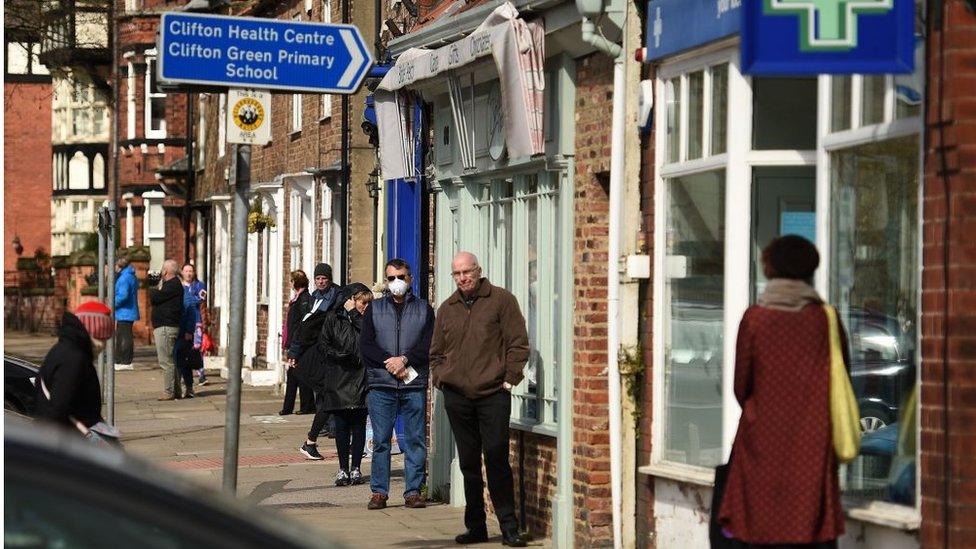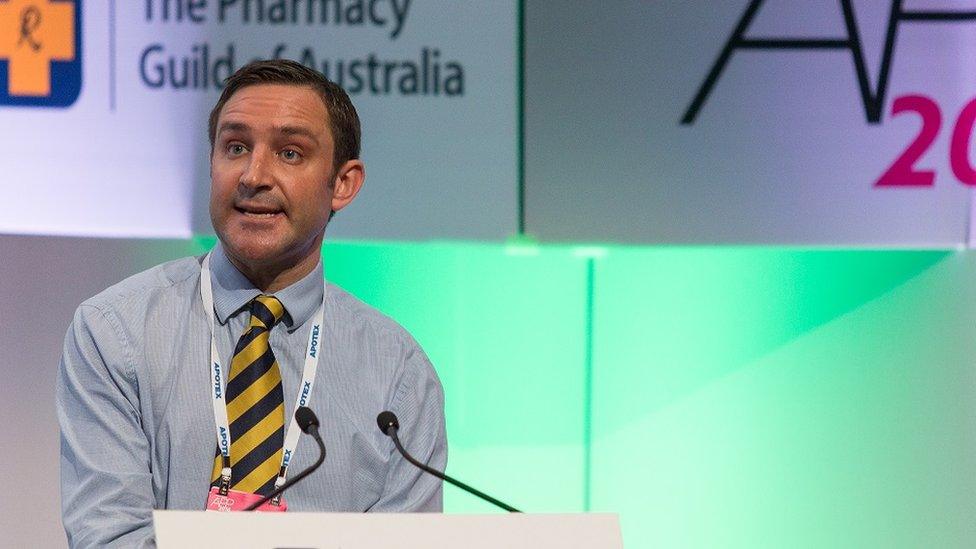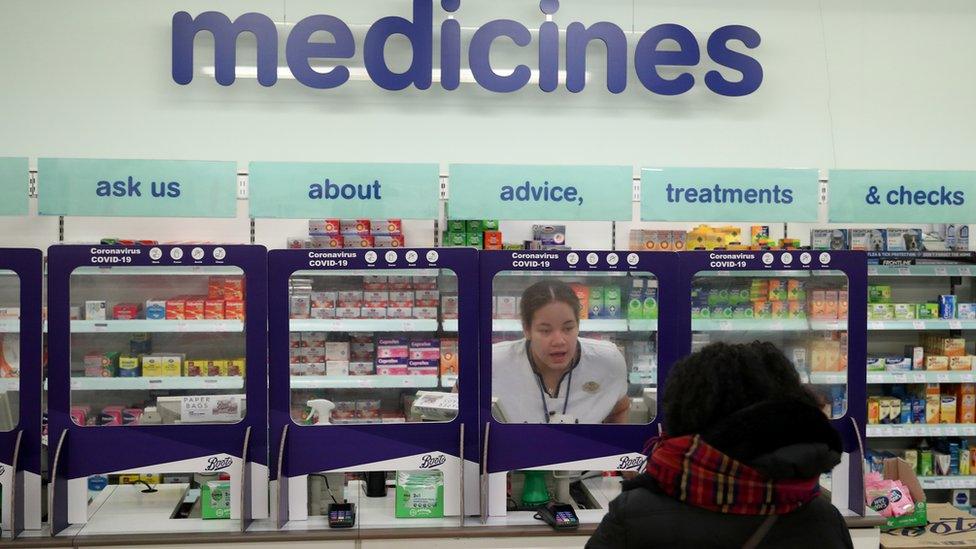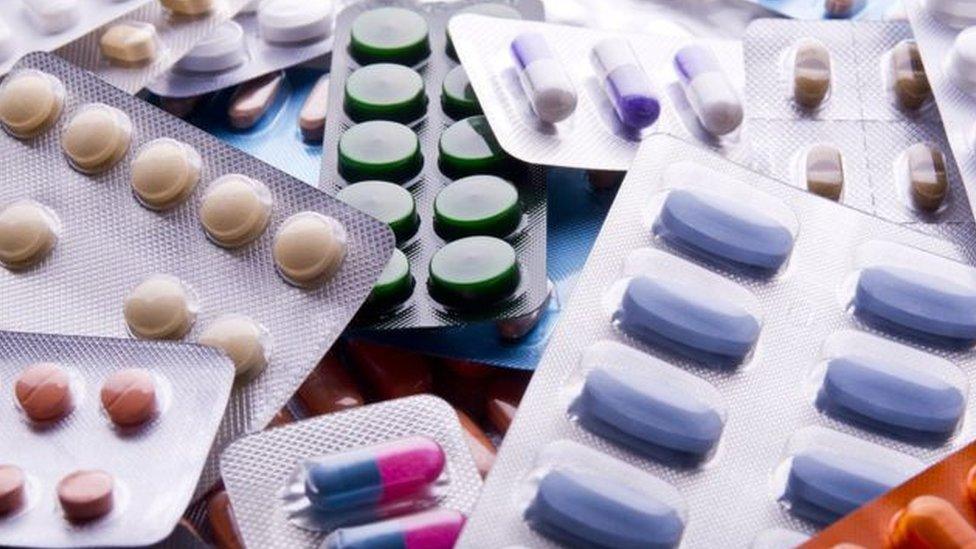Local pharmacies face cash crisis
- Published
- comments

"The last month has been the hardest of my 35 years in pharmacy," said Dai Williams.
He runs two pharmacies in Rhondda in South Wales and while demand has increased massively since the lockdown, that's not been good for business.
That's because the wholesale price of medicine has shot up, cutting margins and putting financial pressures on.
Meanwhile, longer hours and twice as many deliveries have meant higher staff costs.
Thousands of independent community pharmacies across the country are facing a cash crunch.
The net result could be closures, leaving communities around the country with no local chemists.
Sharp rise in prescriptions
Working life for pharmacists has change considerably since the lockdown, said Dai Williams.
"Many of my colleagues have had to shut for a couple of hours during the day just to cope with the extra demands," he reported.
The biggest issue has been a sharp rise in demand for prescriptions.
Making up the medicine is already time-consuming, but currently takes longer because staff are wearing protective equipment.
Social-distancing has also had an effect.
"I have a member of staff going round to doctors surgeries to pick up repeat prescriptions, return to the pharmacy to dispense them, and then deliver them to vulnerable members of the community," said Mr Williams.
The number of deliveries has doubled since the lockdown from 40 to 80 a day.
"We have to cope with the extra work and stress, it's simply what we have to do," he said. "But it's been tough," he admitted.
Counting the cost
Pharmacies aren't cashing in from the extra business as many supply prescriptions at a loss.
That's because the NHS drugs tariff, which pharmacies receive for selling generic prescription drugs, is often lower than the prices suppliers demand.

Pharmacist Mark Burdon sales wholesale drugs prices have risen
That raises the prospect of heavy losses, especially for the majority of community pharmacies that make around 95% of their income from the NHS.
"Suppliers have increased prices since the lockdown," said Mark Burdon, who operates five independent pharmacies in Tyne and Wear.
"The price of paracetamol wholesale climbed from around 50p to £2," he said.
The ramp in the price of hydroxychloroquine - the malaria drug mentioned by Donald Trump as a possible Covid-19 cure - was even more dramatic.
"It used to cost us £2. Now it costs up to £32.49," Mr Burdon said.
Paid in arrears
The surge in demand and higher prices has left Mr Burdon's practices facing a drugs bill more than 50% higher in March than the previous month, which creates its own problems.
"We are effectively paid a couple of months in arrears by the NHS, and we have to pay suppliers before we get the money back," he explained.
"Pharmacies are geared up for that but not these sudden extra charges, which could cause huge cashflow problems for some."
Mr Burdon is one of the regional representatives of the Pharmaceutical Services Negotiating Committee.
He reckons the government should earmark emergency cash to help pharmacies stay afloat.
"The case has been proven for investment in the community pharmacy service as the front door to the NHS, supporting self-care and keeping people away from their GP or the hospital," Mr Burdon said.
Behaviour problems
Meanwhile workers at pharmacies have reported a rise in aggressive behaviour from frustrated customers, with some reportedly even being forced to hire security guards.
Problems became so severe in one area that they launch a local campaign urging patients to respect pharmacy staff.
"We were getting calls that staff were getting abuse from a small number of patients, such as banging on windows and shouting, with one member of staff even reporting being spat at," said Kath Gulson, chief officer of Community Pharmacy Lancashire.
"Problems began with the surge in prescriptions at a time when we faced reduced staff because some were forced to self-isolate.`'
With pharmacies shutting at times to catch up with prescriptions, plus restrictions placed on the amount of over-the-counter drugs that could be bought, some customers got very angry, she said.
They launched the "Care for your pharmacy so your pharmacy can care for you" campaign.
"We're just asking customers to understand the different way we have to operate now and support us so we can support the people that need us."
- Published6 April 2020

- Published25 March 2020
